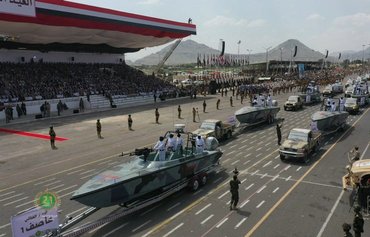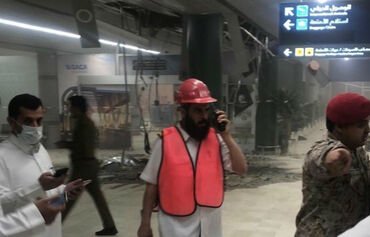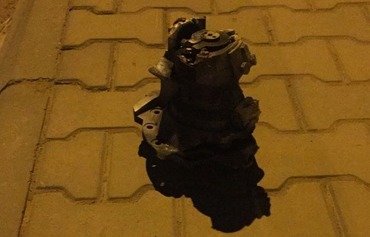Despite Iran's boasting about its "integrated missile network" and missile advancements, fatal blunders by Iranian forces in recent history cast doubt on the power and accuracy of these weapons.
A little more than three years after shooting down Ukraine International Airlines Flight PS752 with two missiles, killing all 176 aboard, Iran has yet to agree to participate in negotiations over reparations with countries from which the victims hail.
Meanwhile, Islamic Revolutionary Guard Corps (IRGC) proxy groups in the region using Iranian missiles and drones continue to claim civilian lives and target critical infrastructure.
Yet late last month, Tehran Times, a pro-regime publication, published an article in which it bragged about developing missiles and drones and distributing them among its proxy groups in the Middle East.
![A screen grab shows Yemenis standing in front of their house after it was demolished by a ballistic missile launched by the Houthis on a residential neighborhood in al-Hodeidah, in October 2020. [Media Centre of the Southern Giants Brigades]](/cnmi_am/images/2023/01/11/40200-yemen-missile-attack-600_384.jpg)
A screen grab shows Yemenis standing in front of their house after it was demolished by a ballistic missile launched by the Houthis on a residential neighborhood in al-Hodeidah, in October 2020. [Media Centre of the Southern Giants Brigades]
The article, ostensibly a historical summary of the last two decades of Iran helping Hamas, the Palestinian Islamic Jihad, Hizbullah, Yemen's Iran-backed Houthis, Iraqi militias and the Syrian regime in developing missiles, provides an overview of Iran's missile threats.
The article glorifies the regime's "integrated missile network" and enumerates the drones and missiles in its arsenal, as well as the ones that it helped its proxies develop based on its models.
But analysts say that Iranian missiles constitute a definite and real danger that must be eliminated, warning that these weapons are keeping the Middle East in a state of constant tension.
Indiscriminate use of missiles
"The Iranian strategy of deploying missiles of all types and explosive-laden drones has one objective: namely, to enable the IRGC and its proxies to have perpetual control" in the region, said Middle East Centre for Regional and Strategic Studies researcher Fathi al-Sayyed, who specialises in Iranian affairs.
"This creates a state of constant instability through which Iran and its affiliates can penetrate the countries of the region," he said.
Past incidents have proven "with conclusive evidence" that Iranian missiles and arms account for a great part of the civilian deaths and destruction that occur at the hands of terror groups throughout the Middle East, he said.
Houthi drones and missiles, for example, have repeatedly targeted airports and oil facilities in neighbouring Saudi Arabia. In the United Arab Emirates (UAE), three people died in a series of strikes last January.
Iran also has launched deadly missiles and drones against Iraq-based Kurdish opposition groups.
The most recent attack happened on November 14 when five Iranian missiles targeted a building used by the Kurdistan Democratic Party of Iran, killing one person and wounding several.
Another attack by the IRGC in late September killed more than a dozen people in Iraq's autonomous Kurdish region.
It is no secret that Hizbullah possesses a large number of Iranian-supplied missiles.
The party manufactures and assembles missile and drone components that arrive from Iran through Syrian airports and ports, and are transported to the party's bases in Lebanon via camouflaged routes, say analysts.
IRGC's grip on Middle East countries
"The IRGC is implementing a plan to tighten its grip on some Middle Eastern countries, such as Lebanon, Syria, Iraq, Yemen and some Palestinian groups, through the proxy groups it has established since it came to power," Iranian affairs researcher Sheyar Turko told Al-Mashareq.
The IRGC has set up factories to assemble missiles in those countries, he said, noting that Iran's proxies pursue the same policy of targeting civilians and ignoring international laws that Iran does.
Most missile attacks target civilians, he said, and are perpetrated by the Houthis in Yemen, "who use them to harm Saudi Arabia and the UAE, in addition to using them inside Yemen".
"The civilian casualties in Yemen are the highest among all the countries in which Iran has deployed these missiles," Turko said.
The basing of missile depots in populated areas is a cause for concern, said Saudi military analyst Mansour al-Shehri.
In Lebanon, residents of areas where Hizbullah wields influence have expressed concern that ammunition and missile depots in these areas might explode.
Similarly in Yemen, the Houthis have transformed the densely populated city of Sanaa, home to more than 2.5 million, into a "military zone" where lethal weapons are assembled and stored in residential neighbourhoods, analysts said.
Iran's missiles are "criminal tools, because they also lack targeting accuracy and hit their targeted areas indiscriminately", al-Shehri said.
"They are susceptible to various malfunctions, and consequently hit civilians and civilian facilities," he added.
Al-Shehri said "we should not be deceived" by Iranian media boasting about the quality and accuracy of these missiles, as they have proven to be "poorly made and lacking control technology".
"They are just indiscriminate flying bombs whose mission is to cause death and destruction."
Iran evades accountability
Iran has about 20 types of ballistic missiles as well as cruise missiles and drones, says the International Institute for Strategic Studies.
In February, the IRGC unveiled the Kheibar Shekan, a medium-range missile it claimed is capable of "hitting targets within a radius of 1,450km".
Yet analysts say Iran's short- and medium-range missiles offer limited strike and deterrence capabilities, and repeated failures and setbacks have undermined any talk of meaningful weapons development.
IRGC forces shot down Flight PS752 shortly after its take-off from Tehran on January 8, 2020.
Three days later, Iran admitted that the IRGC had targeted the Kyiv-bound Boeing 737-800 plane by mistake.
Canada, Britain, Sweden and Ukraine have been seeking reparations on behalf of the victims' families.
The four countries accuse the IRGC of having "launched unlawfully and intentionally" two surface-to-air missiles at the jetliner.
On December 28, the four formally triggered a process to hold Iran legally accountable for shooting down the plane.
They called for an arbitrator to settle claims against Iran, in a move that represents a first step in possibly bringing a case against Tehran at the International Court of Justice, which victims' families have long demanded.
"Those who lost loved ones in the downing of PS752 deserve justice," Canadian Foreign Minister Mélanie Joly said in a tweet.
"We have taken an important step to advance our pursuit of that justice at the international level this week and will continue to work together to hold Iran accountable for this tragedy," she said.

![Iran announced the start of mass production of a new long-range missile known as the Sayyad-4B in November. [Tasnim News]](/cnmi_am/images/2023/01/11/40201-pic_2_-600_384.jpg)







May Allah damn you, o, enemies of humanity! You're killers of children in Iraq, Yemen and Syria. You're still deceiving people, Allah and His Messenger!
Reply1 Comment(s)